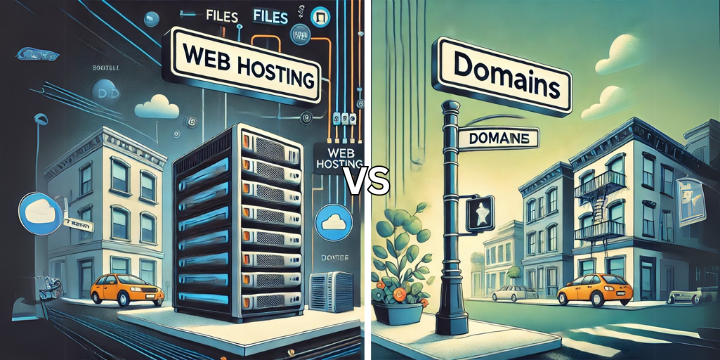What is Web Hosting and Domain
What is Web Hosting and Domain? A Beginner’s Guide to Building Your Website
For those unfamiliar with websites, ‘domain’ and ‘web hosting’ may sound like technical terms. But don’t panic – these concepts are easier than they appear. This guide will explain everything related to web hosting and domains, how they function, and why they are critical components to building a website. You will learn how to begin creating an online presence by the end of this text.
What is Web Hosting?
Web hosting is the service that makes your website available online. Consider it like renting an area on a server to keep all of your website’s files, content, and images. When an individual enters your website’s URL in their browser, the hosting server sends the necessary files to their device and gives them access to your site.
How Does Web Hosting Work?
There’s a server for every website which contains the files for the corresponding website such as HTML, CSS, photos and videos. When a visitor comes to your web page, their browser puts in a request to access those specific files from web hosting companies, which currently have full access to the files all day, every day. Hence, the web hosting company is responsible for each website’s server request. These web hosting providers come equipped with powerful computers, also known as servers.
Types of Web Hosting

There are numerous different types of web hosting services, each one more fitting for a specific purpose:
1. Shared Hosting
If you’re starting your site, this is the perfect option for you; it is the cheapest. It allows multiple sites to share server resources, allowing you to share resources with other sites.
- Pros: Simple to manage, requires no training, inexpensive and can be handled by the hosting service.
- Cons: Not great for optimized performance during busy traffic spikes, has slower response times, and limited resources.
2. VPS Hosting
A great option for companies who are scaling up as it has low-cost performance with more control. The Virtual Private Server has more resources compared to shared hosting.
- Pros: Easy to manage, allows for modifications to be made and has flexibility, making it available for most sites.
- Cons: It has limitations for people with no technical knowledge. Moderate cost compared to shared hosting.
3. Dedicated Hosting
Geared towards large businesses due to the cost which comes with it. Comes with the capability for high-performing servers, providing your self-contained server just for your website.
- Pros: Provides outstanding performance, allows advanced customization, and full control on the user end.
- Cons: Comes with expensive costs and overshadows the other options. Comes with its own set of high technical requirements.
4. Cloud Hosting
Your website is stored on many servers, guaranteeing a high uptime and the ability to scale easily.
- Pros: Reliable, scalable, pay-as-you-go charges.
- Cons: It may be harder for some customers compared to traditional hosting.
What is a domain?

A domain is an address of your website on the internet and what the users type in the browser to access the site, for example, www.yourwebsite.com. Each domain is unique, so no two websites can have the same domain name.
How does a domain work?
Every time you register a domain, each is associated with an IP address, which is basically a number that directs to your web hosting server. The Domain Name System or DNS converts your domain into an IP address and helps users find websites.
Components of a domain name
- Top-level domain (TLD): this is the additional part of the domain, for example, .com, .net, or .org.
- Second-level domain: this is the important part of the domain and, for example, your website at www.yourwebsite.com.
- Subdomain: other parts come before the domain, for example, “blog.yourwebsite.com”.
Choosing the right domain name

- Make sure that it is easily recalled and short; steer away from complex words or temptingly long names.
- Include words that are linked to your firm and domain to diversify the search.
- Replacing Numbers and Hyphens: These symbols are difficult to understand and recall.
- Picking a suitable TLD: While “.com” is the most popular, country-specific ones, like.co.uk, and others like “.net” and “.org” should be considered.
The difference Between Web Hosting and Domain

While web hosting and domains work together, they serve different purposes:
Web hosting
- Stores your website’s files and makes them accessible online
- Allows your website to be retrieved from the internet and hosts its data.
Domain
- This acts as the address users type to find your website.
- Functions as the name of the site and the information users input to access it.
Example
In this case, if your site were a house, the domain would be the address, while hosting would be the land.
Without hosting, there is nowhere for the website to reside. Without a domain, there would be no way to access the website.
How to Choose the Best Web Hosting and Domain for Your Website

1. Understand What You Require
- Shared hosting is user-friendly and an affordable option for novices.
- VPS or cloud hosting works best for more advanced websites.
- Dedicated hosting offers more advanced resources and control, which helps large businesses.
2. Check the Different Providers
Features such as:
- A guarantee on uptime: Aim for 99.9% or more.
- Round-the-clock customer service: 24/7 chat, phone, and email support.
- Scalability: Does your hosting plan accommodate growth in traffic or web pages?
- Pricing: Always keep an eye out for additional costs when comparing unique sets of plans.
3. Register Your Domain
- Select a registrar like Google’s domain service, GoDaddy, or Namecheap and Webhostifier.
- Check if the domain you want is available, and if not, look for other names or extensions.
- Check if domain, peripheral services, or other discounts are offered (such as free domain with hosting).
4. Link Your Domain and Hosting
After the purchases are made, you must first upload your domain and then link it to your hosting server by changing the DNS settings. Guides to this are also provided by most of the hosting providers.
FAQs About Web Hosting and Domains
1. Can I Buy a Domain Without Hosting?
Yes, you can register a domain and not buy a hosting service, however, for your website to be on the internet, it requires hosting.
- How Much Does Web Hosting Cost?
The cost of standard hosting will land you anywhere from $2-$10 a month, while more specialized VPS and dedicated hosting can be anywhere from $20 to $200+ a month.
- What is the Best Domain Extension?
While “.com” is widely regarded as the most useful, trusted and recognized extension, country-specific and niche-specific ones such as “.co.uk” or “.tech” are also fair game.
- Bandwidth in Web Hosting
Bandwidth describes the volume of information that moves back and forth between a visitor and a website. Bandwidth is especially critical for busy sites.
- Uptime in Web Hosting
Uptime means the percentage of time that a website is online and usable. Seek hosting companies that have 99.9% uptime or better.
- Changing Domain Names
Yes, but it’s not wise. Changing a domain can have adverse effects on a company’s SEO and brand name recognition. Take your time in the beginning to make the right decision.
- SSL Explained
It is a technology used to secure the connection between a website and its visitors. It is important for security and SEO, as Google favours HTTPS websites.
Why Web Hosting and Domains Are Important for Your Online Presence?
Web hosting and domains are the foundation of your online presence. A domain name acts as your website’s address, making it easy for users to find you, while web hosting stores your site’s files and ensures it’s accessible 24/7.
- Establishing a Brand: Having a domain name, paired with a web Hosting service that allows for the site to load promptly, makes the brand appear reputable.
- Improving SEO: Credible web hosts will increase the speed at which the website loads, improving its chances of getting ranked by search engines.
- Enhance User Experience: Reliable hosting providers guarantee minimum downtime, allowing for visitors to the site at any time.
- Creating Brand Identity: Having a custom domain name allows users to easily identify and recall your brand.
Mistakes Not to Make When Selecting Domain and Web Hosting
- Go With the Lowest Price: Cheap hosting prices often lead to poor quality service and little to no customer support.
- No Consideration of Scalability: Your hosting needs to fit the size of your website.
- Uptime Guarantees: When service is down, you will lose customers and money.
- Selecting A Domain Name That Is Hard to Remember: Make your domain name easy and catchy.
- Not Study Domain Hosting Companies: Prior to purchasing, read reviews and compare services.
Steps to Take When Creating a Website
- Picking A Hosting Plan: If you are new to owning a website, start with shared hosting.
- Domain Registration: Select a name that ties with your brand.
- Website Builder Through WordPress, Wix, Or Squarespace: These are services offered that enable you to build your website.
- Publish The Content: Once created, pages, blogs, and photos can be added to your site.
- Search Engine Optimization: Improving your ranking requires the use of keywords and descriptions as well as alt text.
- Marketing: Advertise your website on social media platforms, newsletters, and emails.

Conclusion
Grasping the concepts of web hosting and domain names is crucial for web development. There are web hosts who provide the basic structure for your site, and there are domain sellers who give your website an address. With the correct hosting provider, supporting domain name, and marketing, your brand can have a strong online presence.
If you plan to start a personal blog, online shop, or company site, you should get quality hosting services and a strong domain name. Start today and move one step closer to making your ideas a reality!







